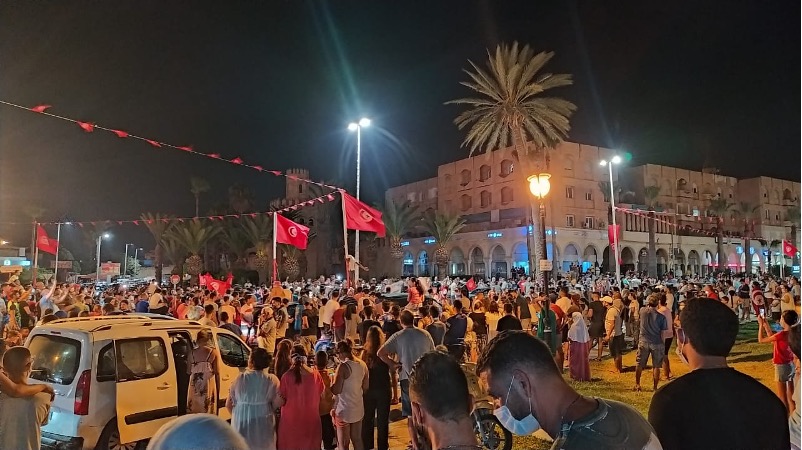After a decade of political unrest and distress, Tunisia’s next step towards democracy started by hosting its first Constitutional Referendum in history. The Constitution was suggested by the current president Kais Saeid who froze and dismantled the parliament, changed the government, and recently created a new constitution for the country, all in one year.
Before these events, the most popular political party with the most seats in the parliament had been the Islamist party and they showcased their opposition for these presidential changes.
Before the revolution in Tunisia, Islamist politicians faced several forms of violence; some were exiled and others were imprisoned or controlled in their homes. After the revolution, when the dictatorship has ended, Islamists started coming back to the country and have made attempts to maintain their power especially in Politics.
They employed religion as a basis for them to win elections, and managed to do so with the parliamentary elections. Nevertheless, they did not succeed in any presidential election that has happened after the 2011 Revolution.
It is important to distinguish between both terms “Islamist” and “Muslim”. Tunisia is a Muslim country, but not an Islamist one. That is to say, its most dominant religion is Islam but it does not practise Islamist politics. The Tunisian laws are civil and the constitution separates between politics and religion. Practising one’s religion freely is also a constitutional right.
Tunisia recognises itself as a “civil state” (Article 2 of the 2014 Constitution) but also recognises that “its religion is Islam” (Article 1 of the 2014 Constitution). This means that in spite of the fact that Islam is the official religion of the country, its laws and practices are expected to be civil, but respectful of Islam. It is simply a Muslim civil country that puts the local constitution at the centre of its politics and at the centre of its laws and practices.
This factor could change if the new 2022 Tunisian constitution gets approved and recognised by the people after the Constitutional Referendum. The expression “its religion is Islam” in the first article of the 2014 Constitution was removed from the new constitution that focused on the secularisation of the state and that the state is the only one that can interfere in maintaining Islam’s values. That is to say, political parties and any other body that wants to gain a higher status in the country should not use religion as the basis for their campaign, but should rather focus on the issues at hand and how to address them.
The political system in Tunisia is expected to be secular and civil, one that follows the constitution, not the religion.
This does not deny the fact that religion is still being utilised by politicians to gain more votes. Some Islamist political parties have been employing religion in their campaigns and trying to manipulate public opinion into electing them.
The Islamist party has been one of the most powerful political parties in the country, especially after the revolution, by occupying most of the seats in the parliament. The reason for their gain in popularity after the revolution, as elders say, including my grandmother, “ They are people who fear God. We want to elect them because we want to avoid living under another dictatorship similar to Ben Ali’s. (Ben Ali was Tunisia’s second president who fled the country after the revolution)”.
Nevertheless, people are still not willing to elect an Islamist party representative for president. This was proved in the latest elections when an independent president was elected (Kais Saied). It was further proved on 25th of July 2021 when people revolted against the parliament and led to its freezing, and dismantlement later on.
This raises the question: why were the Islamists never elected for presidency in spite of the fact that Tunisia is a Muslim country or at least in spite of the fact that majority of Tunisians are Muslim?
To gain an insight from the common people in Tunisia, we asked one citizen about her opinion on the issue and whether she’s for the separation between religion and politics.
“Religion is how you treat people. If you are practicing democracy abiding by laws which are focused on peace, justice, equality, freedom, and mercy, you are not against religion. We don’t have to be picky about religion; we take the things which suit us and reject the things which do not suit us in order to achieve our interests and submit to people or impose on them a new way of life based on feelings of fear and guilt. The state laws are made by people and for the people. Religion is a personal matter. Our relationship with Allah is direct. No one can interfere between Allah and any human being. Our religion is based on moderation. I’m against radicalism; and the end never justifies the means.”
She ended her statement with this answer that summarises everything that she talked about: “Islam is the religion of the individual, not of the state.”
Off-record, she showcased her knowledge and her opinion in relation to the situation in Tunisia especially after the Revolution. She stated how Tunisians would never elect extremists from either side. She explained this by saying: “Extreme religious parties would never win the presidential elections because we are moderate Muslims. Extreme leftist parties who are usually atheist would never win the presidential elections as well because, after all, we are Muslim.” It might seem like a contradictory statement that she explained later on by stating “Neither Radical Islam nor radical secularism would ever flourish in Tunisia.”
The separation between religion and politics has always been an issue in the MENA region. Tunisia, on the other hand, always favoured the separation and advocated for a civil state. People have not welcomed any political suggestion that wanted to fuse religion and politics in the country. The opposition of Islamist parties to the new constitution is still noticeable, and this renders the results of the Referendum unpredictable.






